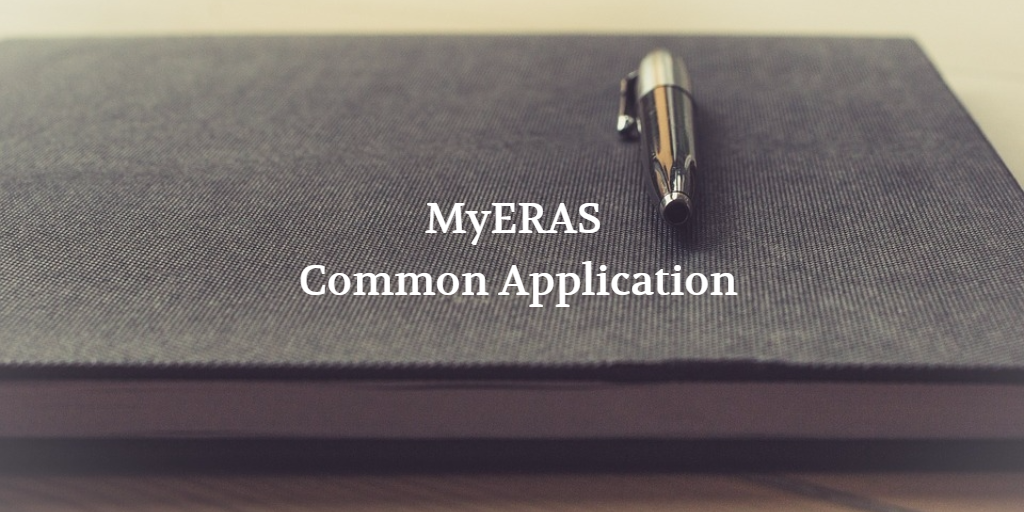
MyERAS Common Application
Token
Medical students are required to obtain what is referred to as a Token in order to begin their residency application. The Token is a unique 14-digit, alpha-numeric code that is requested from ECFMG’s OASIS or the MyECFMG mobile application.
Application
The MyERAS Common Application is composed of a series of questions designed to build a CV/Resume to be accessed by potential residency programs.
The application will consist of the following subject matters:
- Personal
- Match
- Biographic
- Military
- Education/medical education
- Accomplishments
- Experiences (work, research and volunteer)
- Licensure
- Published works & presentations
Once the application is completed and reviewed thoroughly it must be certified. No changes can be made after certification for the remainder of the residency season.
A preview of the application can be found in the Tools for Residency Applicants section of ERAS under ERAS Worksheet.
It is highly recommended to expand on the Hobbies/Interest and Experiences sections in narrative form, no lists or bullet points.
The MyERAS Common Application should remain generic and inclusive not favor any specialty.
Personal Statement (1 per specialty)
The Personal Statement is a short summary in which students introduce themselves to residency programs further. The statement should highlight accomplishments, special characteristics, goals, work ethic, and passion for the medical specialty of preference.
It should be written in a professional format, one page long, one-inch margins, no special characters and in PDF format.
One Personal Statement is required per specialty of interest. As opposed to the application, the statement should be specific to the specialty.
Photograph
A professional headshot is required to identify the student during interviews.
The format should be .JPEG (digital), less than 100 KB (2.5 x 3.5 inches)
A professional headshot is preferred that displays head and shoulders, head centered, eyes forward.
USMLE Exam Transcript
Students are expected to submit a request to release the transcript to programs before being able to apply to them. A transcript of USMLE Step 1, Step 2 CK and Step 2 CS scores and Step 3 if applicable.
The student must request transmission for a $80 one-time fee, new scores require retransmit.
Medical School Transcript
Students are advised to maintain communication with their Medical School and be aware of the contents of their transcript. It should be requested in a timely manner. The academic transcript displays subjects studied and exams background.
Transcripts are submitted for ECFMG Certification and must be resubmit through the ERAS Support Service
Medical Student Performance Evaluation (MSPE)
The MSPE (Previously the Dean’s Letter) measures academic achievement as compared to peers and it’s a requirement. Ideally, students should obtain a copy and review it before submission. Program Directors and Interview Committees will document the absence of this document. Therefore, if unable to provide, the student should submit a placeholder and address the absence in the ERAS application and during the interview.
Letters of Recommendation (LoR) (Recommended 3-4)
Letters of Recommendation are written by professional supervisors, evaluating the student’s performance. They should be specialty specific and from US clinical experience. They are to be recent, within a year of the application’s date.
Program Directors consider these an excellent tool to determine if the applicant displays the characteristics they are looking for. Students are advised to review LoRs with the writer.
Letter Request Forms should be printed and provided to the writers to use.
NEW: Standardized Video Interview (SVI)
Emergency Medicine applicants are now required to submit a Standardized Video Interview (SVI). The SVI was designed to meet the candidate on a deeper level, it’s expected to test professionalism and communication skills.
Applicants will record a total of 6 questions and answers for a score. Students are scored in August.
Students are advised to ensure the interview is recorded in a professional setting with a strong internet connection
IMPORTANT DATES
June 2017-Start Your Program Research
June 20 2017- Tokens for the ERAS 2018 season will be available
July 31, 2017- The deadline for submitting Standardized Video Interview (SVI)
September 1, 2017- Suggested date to have all documents uploaded through OASIS
September 6, 2017- Certifying begins
September 15, 2017- Residency Programs begin receiving applications
October 1, 2017- Medical Student Performance Evaluation (MSPEs) will be released to programs
